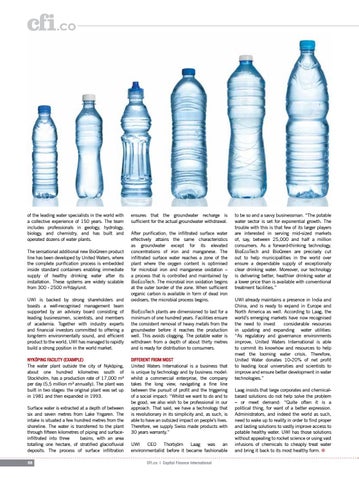of the leading water specialists in the world with a collective experience of 150 years. The team includes professionals in geology, hydrology, biology, and chemistry, and has built and operated dozens of water plants. The sensational additional new BioGreen product line has been developed by United Waters, where the complete purification process is embedded inside standard containers enabling immediate supply of healthy drinking water after its installation. These systems are widely scalable from 300 - 2500 m³/day/unit. UWI is backed by strong shareholders and boasts a well-recognised management team supported by an advisory board consisting of leading businessmen, scientists, and members of academia. Together with industry experts and financial investors committed to offering a long-term environmentally sound, and efficient product to the world, UWI has managed to rapidly build a strong position in the world market. NYKÖPING FACILITY (EXAMPLE) The water plant outside the city of Nyköping, about one hundred kilometres south of Stockholm, has a production rate of 17,000 m³ per day (5,5 million m³ annually). The plant was built in two stages: the original plant was set up in 1981 and then expanded in 1993. Surface water is extracted at a depth of between six and seven metres from Lake Yngaren. The intake is situated a few hundred metres from the shoreline. The water is transferred to the plant through fifteen kilometres of piping and surfaceinfiltrated into three basins, with an area totalling one hectare, of stratified glaciofluvial deposits. The process of surface infiltration 88
ensures that the groundwater recharge is sufficient for the actual groundwater withdrawal. After purification, the infiltrated surface water effectively attains the same characteristics as groundwater except for its elevated concentrations of iron and manganese. The infiltrated surface water reaches a zone of the plant where the oxygen content is optimised for microbial iron and manganese oxidation – a process that is controlled and maintained by BioEcoTech. The microbial iron oxidation begins at the outer border of the zone. When sufficient organic carbon is available in form of dead iron oxidisers, the microbial process begins. BioEcoTech plants are dimensioned to last for a minimum of one hundred years. Facilities ensure the consistent removal of heavy metals from the groundwater before it reaches the production well. This avoids clogging. The potable water is withdrawn from a depth of about thirty metres and is ready for distribution to consumers. DIFFERENT FROM MOST United Waters International is a business that is unique by technology and by business model: whilst a commercial enterprise, the company takes the long view, navigating a fine line between the pursuit of profit and the triggering of a social impact: “Whilst we want to do and to be good, we also wish to be professional in our approach. That said, we have a technology that is revolutionary in its simplicity and, as such, is able to have an outsized impact on people’s lives. Therefore, we supply Swiss made products with 30 years warranty.” UWI CEO Thorbjörn Laag was an environmentalist before it became fashionable CFI.co | Capital Finance International
to be so and a savvy businessman. “The potable water sector is set for exponential growth. The trouble with this is that few of its larger players are interested in serving mid-sized markets of, say, between 25,000 and half a million consumers. As a forward-thinking technology, BioEcoTech and BioGreen are precisely cut out to help municipalities in the world over ensure a dependable supply of exceptionally clear drinking water. Moreover, our technology is delivering better, healthier drinking water at a lower price than is available with conventional treatment facilities.” UWI already maintains a presence in India and China, and is ready to expand in Europe and North America as well. According to Laag, the world’s emerging markets have now recognised the need to invest considerable resources in updating and expanding water utilities: “As regulatory and governance environments improve, United Waters International is able to commit its knowhow and resources to help meet the looming water crisis. Therefore, United Water donates 10-20% of net profit to leading local universities and scientists to improve and ensure better development in water technologies.” Laag insists that large corporates and chemicalbased solutions do not help solve the problem – or meet demand: “Quite often it is a political thing, for want of a better expression. Administrators, and indeed the world as such, need to wake up to reality in order to find proper and lasting solutions to vastly improve access to potable healthy water. UWI has those solutions without appealing to rocket science or using vast infusions of chemicals to cheaply treat water and bring it back to its most healthy form. i
